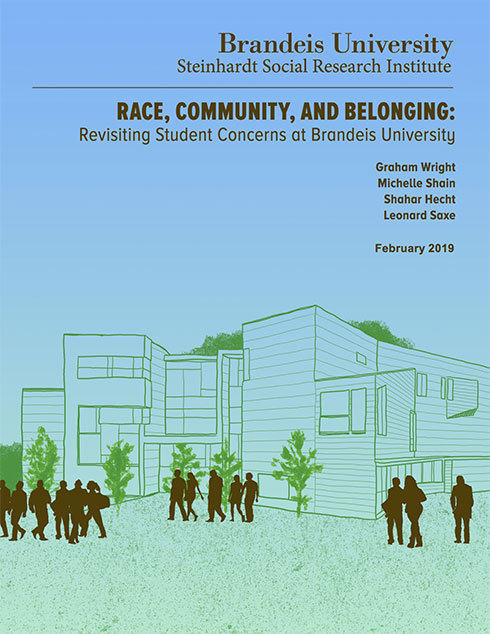Race, Community, and Belonging: Revisiting Student Concerns at Brandeis University
Graham Wright, Michelle Shain, Shahar Hecht, Leonard Saxe
February 2019
 Race, Community, and Belonging: Revisiting Student Concerns at Brandeis University is a new report from our program of research on ethnic and religious identity among US college students. The report follows up an earlier survey of the Brandeis campus in 2016 that resulted in All Together Separate: Race, Ethnicity, and Religion on the Brandeis campus. Repeating the survey in 2018 allowed us to examine the ways in which campus environments and intergroup relations change over time and determine whether the same issues continued to dominate campus conversation.
Race, Community, and Belonging: Revisiting Student Concerns at Brandeis University is a new report from our program of research on ethnic and religious identity among US college students. The report follows up an earlier survey of the Brandeis campus in 2016 that resulted in All Together Separate: Race, Ethnicity, and Religion on the Brandeis campus. Repeating the survey in 2018 allowed us to examine the ways in which campus environments and intergroup relations change over time and determine whether the same issues continued to dominate campus conversation.
Key Findings
- Campus snapshot. In the two years between 2016 and 2018 there was no dramatic change in students' racial/ethnic identification, with nearly half of the students identifying as people of color. Nor were there dramatic changes in the socioeconomic backgrounds of students. There was an increase in the proportion of students identifying as LGBTQ+ and in the proportion of religiously unaffiliated students and a slight decrease in the proportion of Jewish students (27% in 2018 compared to 31% in 2016). The student body became slightly more liberal as the proportion of students who identified as slightly liberal increased.
- Pressing issues. In 2018, the most pressing issues for students at Brandeis were concerns over on-campus food options, student life, and cost. The issues of race, diversity, and inclusion which were the most pressing issues identified in 2016 were far less prominent in 2018: Forty percent listed racial issues as pressing in 2016 versus only 11% in 2018.
- Academics. Undergraduate students at Brandeis were predominantly satisfied with the relevance of the courses to everyday life, class size, contact with faculty, and courses in their major.
- Race and ethnicity. By 2018, awareness of the #FordHall2015 protest was relatively low. Although awareness was higher among Black students, only 52% of all new students had heard about the protest, and 43% of students who were on campus at the time of the protest had not spoken about it during the 2018 spring semester. Most students believed race relations on campus had improved since 2016. Among all four of the largest racial and ethnic groups on campus, there was a significant decline in the proportion of students who agreed there was a hostile climate toward people of color at Brandeis. There was also a substantial, and in some cases a dramatic, decline in the proportion of Black students who reported any of ten forms of discrimination, harassment, or microaggression. At the same time, however, the majority of students agreed that there was little interaction between students of different racial and ethnic groups, and a substantial minority of Black students still felt unwelcome in a campus organization in 2018 or had experienced in-person harassment due to their race.
- Gender and sexual orientation. Rates of discrimination due to gender/sexual orientation declined for all students between 2016 and 2018. The majority of Brandeis students disagreed that at Brandeis, sexual harassment and violence is widespread. LGBTQ+ students were significantly more likely to agree with this statement than cisgender, heterosexual students, and a quarter of LGBTQ+ students reported some form of in-person harassment due to their gender or sexual orientation.
- Campus climate toward Jews and Israel. The vast majority of students at Brandeis, both Jewish and non-Jewish, continued to disagree that Brandeis has a hostile environment toward Jews or Israel. This sentiment regarding the absence of hostility toward Jews or Israel grew even stronger between 2016 and 2018.
- Discussing contentious issues. Between 2016 and 2018 there has been a substantial increase in the proportion of students who disagreed that at Brandeis, unpopular views can be expressed freely (54% in 2016 versus 68% in 2018). While this increase was evident among liberals, moderates, and conservatives, the latter group was the most likely to strongly disagree with this statement.
- Mental health. Sixty-seven percent of Brandeis students reported that emotional and mental health difficulties hurt their academic performance at least once over the past four weeks, and these rates were even higher among female students and, in particular, among LGBTQ+ students. Although most students appeared knowledgeable about the mental health resources available on campus, a number of students expressed concerns about the school's efforts to address mental health issues.
- Sense of belonging. The majority of students felt that they belonged at Brandeis at least a little. Although the proportion of Black students who felt that they did not belong at Brandeis at all has dramatically declined since 2016, the proportion of Black students who felt that they somewhat or very much belonged on campus also declined. Political moderates and conservatives were also less likely to feel like they very much belonged at Brandeis, compared to political liberals, which was not the case in 2016.